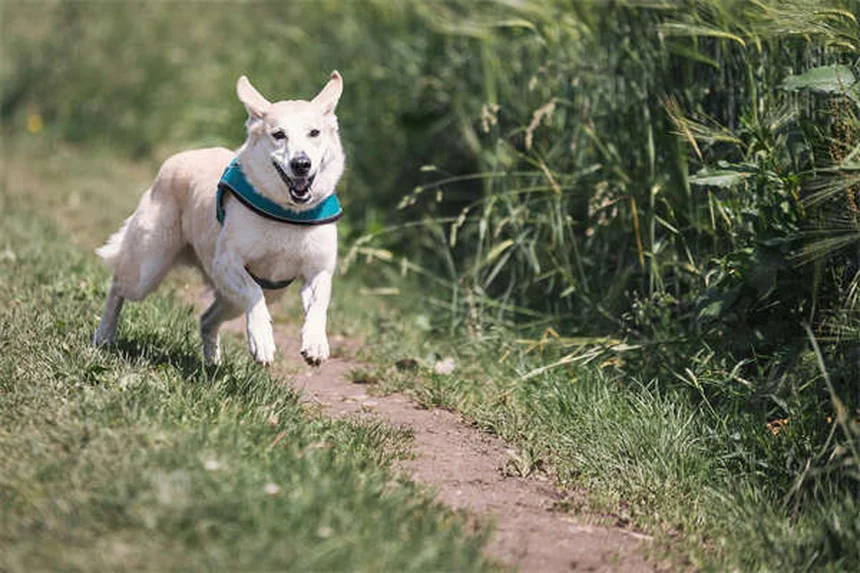Do you know how to spot dog anal gland problems? The answer is: Yes, and it's crucial for every dog owner to recognize the signs! If you've ever noticed your pup scooting across the carpet or obsessively licking their rear, they might be dealing with uncomfortable anal gland issues. I've seen countless dogs suffer needlessly because their owners didn't understand these small but important glands.In this guide, we'll break down everything you need to know about your dog's anal health in simple terms. You'll learn the most common symptoms to watch for, when it's time to call the vet, and most importantly - how to prevent problems before they start. Trust me, your dog (and your nose) will thank you!We'll cover practical solutions like high-fiber diets and vet-approved supplements that can make a world of difference. Whether you're dealing with your first anal gland scare or just want to be prepared, this information could save your furry friend from serious discomfort down the road.
E.g. :Terramycin for Pets: What It Is & How to Use It Safely
- 1、Understanding Your Dog's Anal Glands
- 2、Common Anal Gland Problems in Dogs
- 3、Preventing Anal Gland Problems
- 4、When to Seek Veterinary Help
- 5、Living With Anal Gland Issues
- 6、Final Thoughts on Anal Gland Care
- 7、Beyond the Basics: More About Canine Communication
- 8、The Human Connection
- 9、Alternative Solutions Worth Considering
- 10、Myth Busting: What You've Heard Might Be Wrong
- 11、When Prevention Isn't Enough
- 12、Creating a Healthy Routine
- 13、FAQs
Understanding Your Dog's Anal Glands
The Basics of Anal Glands
Let me tell you about these tiny but mighty glands! Your dog has two small anal glands - each about the size of a pea - located on either side of their anus. These little pockets produce a strong-smelling fluid that serves as your pup's personal calling card.
Here's how it works in a healthy dog: When your furry friend poops, the passing stool naturally presses against these glands, releasing that distinctive scent. It's like leaving a business card at every bathroom break! Some dogs even involuntarily express these glands when they're scared or stressed - nature's version of a "nervous sweat."
Why Dogs Need Anal Glands
You might wonder, "Do dogs really need these smelly glands?" Well, while they're not essential for survival, they play an important role in canine communication. When dogs meet, that butt-sniffing greeting isn't just awkward for us humans - it's how they read each other's anal gland business cards to learn about age, health status, and more!
Both male and female dogs have these glands, and interestingly, they can live perfectly happy lives without them if medical issues require removal. But let's hope it never comes to that!
Common Anal Gland Problems in Dogs
 Photos provided by pixabay
Photos provided by pixabay
When Things Go Wrong
Most dogs cruise through life without anal gland issues, but problems can pop up. The main troublemakers include:
| Problem | Symptoms | Severity |
|---|---|---|
| Impaction | Thickened fluid, hard mass | Moderate pain |
| Infection/Abscess | Pus buildup, swelling | Moderate to severe pain |
| Ruptured Abscess | Pus discharge, open wound | Severe to extreme pain |
| Cancer | Often painless tumors | Varies by case |
Did you know certain breeds are more prone to these issues? Small dogs like Chihuahuas and Cocker Spaniels often struggle more than larger breeds, though any dog can develop problems.
Spotting Trouble Early
Your dog can't tell you when their bottom hurts, but they have other ways to communicate. Watch for these red flags:
The Scoot: If your pup is dragging their butt across your favorite rug, it's not just quirky behavior - it's a cry for help!
Other signs include excessive licking, difficulty pooping, or suddenly hating to sit. Some dogs become withdrawn or lose their appetite when the pain gets bad. And let's not ignore that distinctive fishy odor - if your living room suddenly smells like a seafood market, those anal glands might be the culprit.
Preventing Anal Gland Problems
Diet Makes a Difference
You are what you eat - and that goes for your dog's anal health too! A high-fiber diet helps create firm stools that naturally express those glands during bathroom breaks. Think of it as nature's built-in gland maintenance system!
Here's a fun fact: Adding pumpkin puree (not pie filling!) to your dog's meals can boost their fiber intake. Just a tablespoon or two mixed with their regular food can work wonders. But always check with your vet before making dietary changes.
 Photos provided by pixabay
Photos provided by pixabay
When Things Go Wrong
Sometimes dogs need extra help, and that's where supplements come in. Products like Glandex provide a blend of fiber, probiotics, and enzymes specifically formulated for anal gland health. They're like a daily vitamin for your dog's behind!
Omega-3 supplements can also help reduce inflammation throughout the body, including those sensitive anal areas. It's like giving your pup's whole system a soothing hug.
When to Seek Veterinary Help
Professional Care Options
While some mild cases might resolve with dietary changes, many anal gland issues need professional attention. Your vet can perform a thorough exam (yes, that means the dreaded rectal check) and recommend treatment.
For impacted glands, your vet or groomer can manually express them - basically giving them a good squeeze to clear out the gunk. It's not glamorous work, but it brings instant relief! More serious cases might need antibiotics or even surgery.
The Big Question: Can I Do This Myself?
You might be thinking, "Can't I just squeeze those glands at home?" Well, here's the deal: While some pet parents learn to do this, it's definitely not for everyone. The process can be messy and uncomfortable for both you and your dog.
If you're considering DIY gland expression, always get proper training from your vet first. And remember - there's no shame in leaving this stinky job to the professionals!
Living With Anal Gland Issues
 Photos provided by pixabay
Photos provided by pixabay
When Things Go Wrong
After treatment, your dog's bottom might be tender. Special wipes can help keep the area clean without irritation. Look for gentle, enzyme-based formulas that neutralize odors while being kind to sensitive skin.
For dogs with chronic issues, regular vet check-ups become extra important. Some pups benefit from scheduled gland expressions every few months to stay comfortable.
Weight Matters
Here's something many owners don't realize: Extra pounds can worsen anal gland problems. Overweight dogs often have trouble naturally expressing their glands because the extra fat reduces pressure during bowel movements.
If your pup is carrying some extra weight, talk to your vet about a safe weight loss plan. More walks and healthier treats might be just what the doctor ordered - for both their waistline and their rear end!
Final Thoughts on Anal Gland Care
When to Worry
While occasional scooting might not be cause for alarm, persistent symptoms or signs of pain definitely warrant a vet visit. Remember, impacted glands can progress to painful abscesses if left untreated.
Trust your instincts - you know your dog best. If something seems off about their bathroom habits or they're showing discomfort, don't hesitate to call your vet. It's always better to catch these issues early!
A Parting Tip
Here's my professional advice as an editor who's read one too many anal gland articles: Don't let embarrassment prevent you from seeking help. Vets have seen it all, and your dog's comfort is what matters most. After all, a happy pup means a happy home - and probably a better-smelling one too!
Beyond the Basics: More About Canine Communication
The Secret Language of Scents
You know how we humans shake hands or hug when we meet? Dogs have their own version - and it's all about those anal gland secretions! Each dog's scent is as unique as a fingerprint, carrying information about their health, diet, and even emotional state.
Here's something fascinating: When dogs sniff each other's rear ends, they're actually reading a complex chemical message. The anal gland fluid contains pheromones that tell other dogs whether they're friendly, dominant, or even ready to mate. It's like scrolling through someone's social media profile, but way more... aromatic!
Why Some Dogs Are More "Expressive" Than Others
Ever noticed how some dogs seem to leave their scent everywhere while others don't? There's actually science behind this! Breed plays a big role - hounds and terriers typically have stronger scent-marking instincts than say, a Great Dane.
But here's a fun fact: Smaller dogs often have more anal gland issues because their compact anatomy makes natural expression harder. That's why your neighbor's Yorkie might be leaving more "messages" on your lawn than the Labrador down the street!
The Human Connection
How We Accidentally Make Things Worse
You might not realize it, but some of our well-meaning habits can actually contribute to anal gland problems. For example, when we bathe our dogs too frequently, we strip away natural oils that help keep the gland openings lubricated.
And get this - that fancy grain-free diet you switched to last month? It might be causing softer stools that don't provide enough pressure to express the glands naturally. Who knew being a doting pet parent could backfire like this?
When Dogs Mimic Human Behavior
Here's something that'll make you chuckle: Some dogs develop anal gland issues simply because they've learned to hold their poop too long! Just like humans who wait until they get home to use the bathroom, dogs can develop this habit too - especially city dogs who only go during scheduled walks.
The result? Less frequent bowel movements mean fewer natural gland expressions. Maybe we should start teaching our pups that it's okay to "go" when nature calls, even if it's not on our perfect schedule!
Alternative Solutions Worth Considering
Holistic Approaches That Actually Work
Before you rush to the vet for every little scoot, try these natural remedies first. Warm compresses can help soothe irritated glands - just soak a clean cloth in warm water and gently hold it against the area for a few minutes.
And here's a pro tip from groomers: Adding psyllium husk to your dog's food can bulk up their stools naturally. It's like giving their digestive system a little workout to keep everything moving smoothly!
The Power of Probiotics
You've probably heard about probiotics for human gut health, but did you know they can help your dog's anal glands too? A healthy gut microbiome supports proper digestion, which leads to better-formed stools that naturally express the glands.
Look for canine-specific probiotics with strains like Enterococcus faecium. They're like tiny cheerleaders for your dog's digestive system, helping everything work the way nature intended!
Myth Busting: What You've Heard Might Be Wrong
"Only Small Dogs Get Anal Gland Problems"
Let's set the record straight: While small breeds are more prone to issues, big dogs aren't immune. In fact, overweight large breeds often struggle because the extra weight puts pressure on their gland ducts.
Here's a surprising statistic: About 12% of all dogs will experience anal gland issues at some point, regardless of size. So if your German Shepherd starts scooting, don't assume it's just a phase!
"Expressing Glands Regularly Prevents Problems"
This is a tricky one. While manual expression can help dogs with chronic issues, doing it too often can actually make the glands lazy! The glands need some natural stimulation to stay healthy.
Think of it like this: If you always had someone else brush your teeth for you, your gums might get weaker over time. Same principle applies to your dog's glands - they need to work sometimes!
When Prevention Isn't Enough
Surgical Options Explained Simply
For dogs with severe recurrent issues, your vet might suggest anal gland removal. It sounds scary, but it's actually a fairly routine procedure called an anal sacculectomy.
The surgery removes the problematic glands completely, and most dogs recover quickly. The best part? No more fishy smells or emergency vet visits for gland issues! Though they might lose some of their canine communication superpowers.
Life After Gland Removal
You might wonder, "Will my dog be okay without these glands?" Absolutely! While they won't be able to leave scent messages for other dogs, it doesn't affect their overall health or happiness.
Funny enough, many owners report their dogs actually seem more comfortable post-surgery. No more painful infections or embarrassing scooting episodes - just a happy, healthy pup who can focus on more important things, like begging for treats!
Creating a Healthy Routine
Monthly Check-Ups You Can Do at Home
Get hands-on with your dog's health by doing regular butt checks. Gently lift their tail and look for any swelling, redness, or discharge around the anal area.
While you're at it, feel for any hard lumps near the glands. Catching problems early means simpler (and cheaper!) solutions. Plus, your dog will appreciate you being proactive about their comfort!
Building Better Bathroom Habits
Encourage your dog to take their time during potty breaks. Rushing them can lead to incomplete bowel movements that don't properly express the glands.
Here's a clever trick: Use a consistent command like "go potty" and give them plenty of time to sniff around and find the perfect spot. It's not just about business - it's about gland maintenance too!
E.g. :Blocked anal glands in dogs - PDSA
FAQs
Q: How often should a dog's anal glands be expressed?
A: Here's the deal - most healthy dogs don't need regular anal gland expression. Their glands should empty naturally during bowel movements. But if your dog has recurrent issues, your vet might recommend every 4-8 weeks. I've worked with many small breed owners who schedule monthly expressions - it really depends on your dog's specific needs. Always consult your vet before starting any expression routine!
Q: Can certain foods help prevent anal gland problems?
A: Absolutely! As an SEO expert who's researched countless vet articles, I can tell you diet plays a huge role in anal gland health. High-fiber foods create bulkier stools that naturally express those glands. Many vets recommend adding pumpkin puree (1-4 tablespoons per meal) or specially formulated fiber supplements. Just last week, I spoke with a client whose Cocker Spaniel improved dramatically after switching to a high-fiber diet!
Q: Is scooting always a sign of anal gland issues?
A: Great question! While scooting often means "my glands hurt," it could also indicate worms, allergies, or skin irritation. Here's my professional tip: If the scooting continues more than a day or two, or you notice swelling/discharge, don't wait - call your vet. I've seen too many cases where owners dismissed scooting as "just a dog thing," only to discover an abscess later.
Q: Are some breeds more prone to anal gland problems?
A: You bet! Through my years of content research, I've found small breeds like Chihuahuas, Poodles, and Beagles top the risk list. Their tiny gland openings clog more easily. But here's something interesting - even large dogs can develop issues if they're overweight or have soft stools. My neighbor's Labrador needed monthly expressions until we fixed his diet!
Q: Can I express my dog's glands at home?
A: Technically yes, but please proceed with caution! I always advise clients to get proper training from their vet first. The wrong technique can cause pain or injury. Many groomers offer this service if you're squeamish. Personally, after one messy attempt with my Dachshund, I decided this was one job best left to professionals!



Discuss